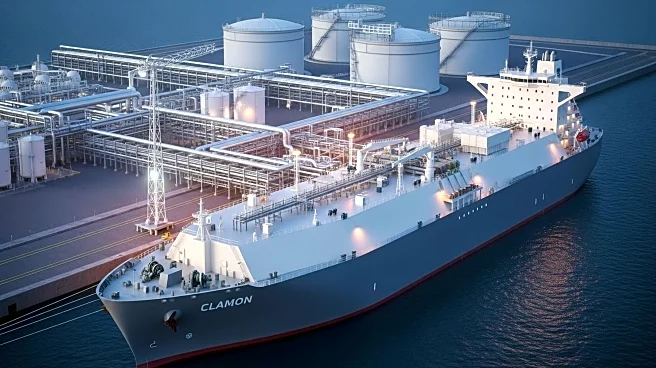What's Happening?
Shell's LNG Canada project is nearing the milestone of loading its first liquefied natural gas (LNG) cargo from its second unit, known as Train 2. This development is part of a broader production ramp-up at the facility located in British Columbia. According to sources familiar with the matter, Train 2 began its start-up activities recently, and shippers have been advised to prepare vessels for loading between early October and early November. The facility, which is Canada's first LNG project, is strategically positioned to meet the growing demand for natural gas, particularly from Asian markets. Shell, the majority stakeholder, along with partners Petroliam Nasional Bhd., PetroChina Co., Mitsubishi Corp., and Korea Gas Corp., aims to fully ramp up the two-train facility by 2026.
Why It's Important?
The ramp-up of Shell's LNG Canada project is significant for several reasons. Firstly, it marks a critical step in Canada's entry into the global LNG market, potentially enhancing the country's energy export capabilities. The project is expected to play a crucial role in meeting the increasing demand for LNG in Asia, thereby strengthening trade relations and economic ties with the region. Additionally, the successful operation of Train 2 could bolster Shell's position as a leading player in the LNG industry, providing a competitive edge in the global energy market. The involvement of major international stakeholders underscores the project's importance in the context of global energy supply chains.
What's Next?
As Train 2 continues its start-up activities, stakeholders and industry observers will be closely monitoring the timing and efficiency of the first cargo loading. The successful operation of Train 2 is expected to pave the way for the facility to reach full capacity by 2026, aligning with Shell's strategic goals. The project's progress may also influence future investments in LNG infrastructure in Canada, potentially attracting more international partnerships and boosting the country's energy sector. Additionally, the ramp-up could prompt discussions on regulatory and environmental considerations associated with LNG production and export.
Beyond the Headlines
The development of LNG Canada highlights broader trends in the energy sector, including the shift towards cleaner energy sources and the geopolitical implications of energy trade. As countries seek to reduce carbon emissions, LNG is increasingly viewed as a transitional fuel that can help bridge the gap between fossil fuels and renewable energy. The project's success could also influence policy decisions related to energy security and sustainability, as well as Canada's role in global climate initiatives.








